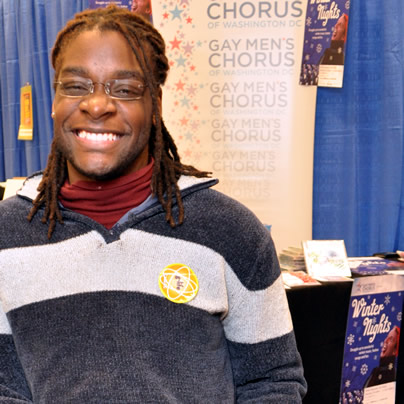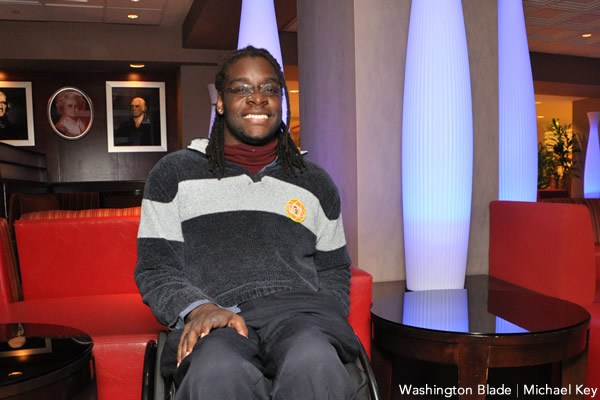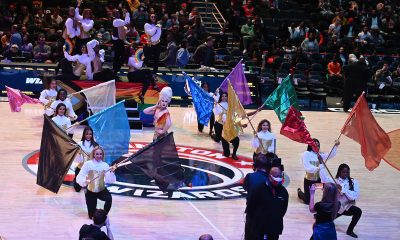Arts & Entertainment
Queery: D’Arcee Charington Neal
The Gay Men’s Chorus baritone answers 20 gay questions

D’Arcee Charington Neal got in the Gay Men’s Chorus by the narrowest of margins.
A friend was auditioning back in August and Neal asked about it. Initially thinking he’d missed the deadline, he double checked the date and realized about 3 p.m. on the final day, he had until 5 to try out, so he did. He had never heard the Chorus or even realized there was such an outfit, but is enjoying his first season with the group. He sings baritone. Next weekend, the group gives three performances of its “Winter Nights” show at Lisner Auditorium (730 21st Street, NW; gmcw.org for details).
Neal is excited for the show.
“It will just be marvelous,” Neal says. “I’ve never really seen anything like it. … It’s everything from Bollywood to West African holiday music to traditional Latin choral arrangements.”
Neal, a 26-year-old Cary, N.C., native, came to Washington in 2007 for an internship. After completing a master’s degree (in creative and professional wiring) at London’s University of Roehampton, he returned to the District mostly because the Metro system makes it easy for him to get around.
“People in D.C. make fun of it, but they really have no idea,” he says. “From a disabled person’s perspective, it’s really the best thing in the U.S. I’ve ridden almost every underground in the country and D.C.’s is by far the best I’ve ever been on.”
Neal is single and lives in College Park, Md. He’s looking for writing work and says his disability has made finding employment difficult. He eventually wants to move into the District.
In his free time, he enjoys writing, cooking, singing and playing Call of Duty.
How long have you been out and who was the hardest person to tell?
I’ve been out since I was 17, and it was definitely my parents. My mother looked me in my face and said that she wished that I would have gotten AIDS and died so they could’ve mourned me and moved on already. That’s rough. But I know as older black people, they come from a different time. And as a disabled black person, they feel like I already have two strikes on my life, so they think being gay is something else I’m adding to make my life harder. (Editor’s note — Neal’s mother, Katherine Neal e-mailed the Blade and said she never said this.)
Who’s your LGBT hero?
Lady Gaga. Outside of being outrageously talented, I can’t think of anyone who genuinely works for the good of the gays and really believes in what they do, on her level. As a megastar she could be about anything, but she has taken this platform up, and I can’t thank her enough for it.
What’s Washington’s best nightspot, past or present?
I was a huge fan of club Apex. Coming from Bible Belt North Carolina, it was like this holy megaplex of debauchery. Multiple floors of thumping bass, and flashing lights, and all those shirtless men!
Describe your dream wedding.
Oh God, I’ve spent forever fantasizing about this. Probably in the courtyard of the Louvre Museum at night, candles everywhere standing in front of that glass pyramid, black and white roses scattered the ground. But my tux would be the star of the show. People don’t seem to understand that when you’re in a wheelchair you never get to be passionate about clothes, because half the time you can’t show them off! I’d want a three foot white silk train on the back of my coat draped down behind my chair in between the wheels and a matching fedora with a veil attached over my face. It’d be the most fabulous thing since J-Lo’s “The Dress.”
What non-LGBT issue are you most passionate about?
Without a doubt, disability acceptance in America. For the life of me, I cannot understand why disabled unemployment is at 75 percent, compared to the national average of 7.9 percent. … It feels like as a country, America is choosing to leave us behind. My parents fought to make sure I had a good education, and graduating from London in 2011, with my master’s degree, I felt like they did a great job. But the reality is, I’ve been unemployed for nearly two years, and while I’m waiting for the right opportunity, my disability makes employers believe I can’t work as a waiter, or in a grocery store or as a barista. And so I, like a lot of people, live off benefits, in an attempt to wait the economy out. And it’s not just me. This is the situation for lots of recent graduates with disabilities.
What historical outcome would you change?
I think I’d go back to the day Dr. Martin Luther King Jr. got shot and stop that. I honestly believe that a lot of the drama and the situations that Americans have been through since the end of Civil Rights (gangs, drugs, welfare, 9-11, education gaps, etc.) wouldn’t be half of what they are today.
What’s been the most memorable pop culture moment of your lifetime?
I think that would have to be when I sat in a room with Nikki Giovanni practically by myself and talked with her for half an hour. This woman embodies the last of everything my parents talk about in regards to American history, and she’s simply phenomenal in every way.
On what do you insist?
That there is no better food on earth than in the American Southeast.
What was your last Facebook post or Tweet?
Turducken is a deliciously grotesque mutation of God’s humblest creations.
If your life were a book, what would the title be?
“Life is Like a [Multifacted, Hypersensitive, Cracked, Racist, Overrated and Underappreciated] Box of Chocolates”
If science discovered a way to change sexual orientation, what would you do?
Read the fine print for the inevitably horrible side effects.
What do you believe in beyond the physical world?
Existence beyond emotions. An end to caring.
What’s your advice for LGBT movement leaders?
Consider all of your audience, and not just the popular section.
What would you walk across hot coals for?
Love. Someone who sees me a whole person, not in sections.
What LGBT stereotype annoys you most?
The idea that all gay men are weak and feminine. I’ve dated some men who could rip phonebooks in half, as well as a 2008 Olympian.
What’s your favorite LGBT movie?
“To Wong Foo, Thanks for Everything, Julie Newmar.” Noxzema is a chocolate goddess.
What’s the most overrated social custom?
Hugging. Being in a wheelchair, people are always so awkward about it. Either do it right, or don’t.
What trophy or prize do you most covet?
Probably my master’s degree from London. Considering what I had to do to get it, it definitely took the most work.
What do you wish you’d known at 18?
That I am not ugly or broken, and that not all men mean what they say.
Why Washington?
Two words: The Metro.

Team DC, the umbrella organization for LGBTQ-friendly sports teams and leagues in the D.C. area, held its annual Night of Champions Awards Gala on Saturday, April 20 at the Hilton National Mall. The organization gave out scholarships to area LGBTQ student athletes as well as awards to the Different Drummers, Kelly Laczko of Duplex Diner, Stacy Smith of the Edmund Burke School, Bryan Frank of Triout, JC Adams of DCG Basketball and the DC Gay Flag Football League.
(Washington Blade photos by Michael Key)




















The 2024 National Cannabis Festival was held at the Fields at RFK Stadium on April 19-20.
(Washington Blade photos by Michael Key)
















Covering the @NatlCannaFest at RFK Stadium for @WashBlade . Stop by the LGBTQ+ booth and pick up a paper if you are here. pic.twitter.com/is7hnsaPns
— Michael Patrick Key (@MichaelKeyWB) April 20, 2024
Theater
‘Amm(i)gone’ explores family, queerness, and faith
A ‘fully autobiographical’ work from out artist Adil Mansoor

‘Amm(i)gone’
Thorough May 12
Woolly Mammoth Theatre
641 D St., N.W.
$60-$70
Woollymammoth.net
“Fully and utterly autobiographical.” That’s how Adil Mansoor describes “Amm(i)gone,” his one-man work currently playing at Woolly Mammoth Theatre.
Both created and performed by out artist Mansoor, it’s his story about inviting his Pakistani mother to translate Sophocles’s Greek tragedy “Antigone” into Urdu. Throughout the journey, there’s an exploration of family, queerness, and faith,as well as references to teachings from the Quran, and audio conversations with his Muslim mother.
Mansoor, 38, grew up in the suburbs of Chicago and is now based in Pittsburgh where he’s a busy theater maker. He’s also the founding member of Pittsburgh’s Hatch Arts Collective and the former artistic director of Dreams of Hope, an LGBTQ youth arts organization.
WASHINGTON BLADE: What spurred you to create “Amm(i)gone”?
ADIL MANSOOR: I was reading a translation of “Antigone” a few years back and found myself emotionally overwhelmed. A Theban princess buries her brother knowing it will cost her, her own life. It’s about a person for whom all aspirations are in the afterlife. And what does that do to the living when all of your hopes and dreams have to be reserved for the afterlife?
I found grant funding to pay my mom to do the translation. I wanted to engage in learning. I wanted to share theater but especially this ancient tragedy. My mother appreciated the characters were struggling between loving one another and their beliefs.
BLADE: Are you more director than actor?
MANSOOR: I’m primarily a director with an MFA in directing from Carnegie Mellon. I wrote, directed, and performed in this show, and had been working on it for four years. I’ve done different versions including Zoom. Woolly’s is a new production with the same team who’ve been involved since the beginning.
I love solo performance. I’ve produced and now teach solo performance and believe in its power. And I definitely lean toward “performance” and I haven’t “acted” since I was in college. I feel good on stage. I was a tour guide and do a lot of public speaking. I enjoy the attention.
BLADE: Describe your mom.
MANSOOR: My mom is a wonderfully devout Muslim, single mother, social worker who discovered my queerness on Google. And she prays for me.
She and I are similar, the way we look at things, the way we laugh. But different too. And those are among the questions I ask in this show. Our relationship is both beautiful and complicated.
BLADE: So, you weren’t exactly hiding your sexuality?
MANSOOR: In my mid-20s, I took time to talk with friends about our being queer with relation to our careers. My sexuality is essential to the work. As the artistic director at Dreams of Hope, part of the work was to model what it means to be public. If I’m in a room with queer and trans teenagers, part of what I’m doing is modeling queer adulthood. The way they see me in the world is part of what I’m putting out there. And I want that to be expansive and full.
So much of my work involves fundraising and being a face in schools. Being out is about making safe space for queer young folks.
BLADE: Have you encountered much Islamophobia?
MANSOOR: When 9/11 happened, I was a sophomore in high school, so yes. I faced a lot then and now. I’ve been egged on the street in the last four months. I see it in the classroom. It shows up in all sorts of ways.
BLADE: What prompted you to lead your creative life in Pittsburgh?
MANSOOR: I’ve been here for 14 years. I breathe with ease in Pittsburgh. The hills and the valleys and the rust of the city do something to me. It’s beautiful, it’ affordable, and there is support for local artists. There’s a lot of opportunity.
Still, the plan was to move to New York in September of 2020 but that was cancelled. Then the pandemic showed me that I could live in Pittsburgh and still have a nationally viable career.
BLADE: What are you trying to achieve with “Amm(i)gone”?
MANSOOR: What I’m sharing in the show is so very specific but I hear people from other backgrounds say I totally see my mom in that. My partner is Catholic and we share so much in relation to this.
I hope the work is embracing the fullness of queerness and how means so many things. And I hope the show makes audiences want to call their parents or squeeze their partners.
-

 South America4 days ago
South America4 days agoDaniel Zamudio murderer’s parole request denied
-

 Maryland5 days ago
Maryland5 days agoMontgomery County police chief discusses arrest of trans student charged with planned school shooting
-

 State Department1 day ago
State Department1 day agoState Department releases annual human rights report
-

 Theater4 days ago
Theater4 days ago‘Amm(i)gone’ explores family, queerness, and faith













